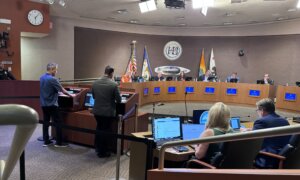A California bill would alter California’s open meeting laws to allow student body associations of community colleges to host meetings via teleconference.
State Assembly Bill 1855, authored by Assemblymember Joaquin Arambula, would allow community college boards and student associations to use teleconferencing without meeting all of the requirements of the Ralph M. Brown Act, a 1953 law that guarantees the public’s right to attend and participate in meetings of local legislative bodies.
During the COVID-19 pandemic, Gov. Gavin Newsom made several temporary changes to the Brown Act to allow for fully virtual meetings. However, once he ended the COVID-19 state of emergency in February 2023, full Brown Act rules were reinstated.
However, since then some have advocated for increased use of teleconferencing, arguing it gives the public greater access and opportunity to participate.
“During the COVID-19 public health emergency, audio and video teleconferencing was successfully used to increase participation and protect the health and safety of civil servants and the public,” Mr. Arambula stated in an April analysis of the bill. “It is time to update the [Brown] Act to reflect modern times and new challenges faced by our students.”
He argued that the act’s current provisions “may serve as a barrier to access for students who are disabled, have limited access to transportation, or are otherwise unable to participate in the meetings in person.”
If Assembly Bill 1855 is approved, such community college associations won’t have to meet some of the agenda notification requirements of the act; make teleconference locations accessible to the public; and won’t have to have a quorum of members of the student body association participate from locations within the boundaries of their represented area.
However, in order for a student association to meet via teleconference it must have a quorum of members present, post meeting agendas and give members notice of the means by which they can access the meeting and make comments, The associations using teleconferencing would also have to have have oversight by the community college’s board of trustees.
“Students should be able to participate in their student body associations without threat to safety, privacy, or accessibility,” Mr. Arambula said.
The Student Senate for California Community Colleges, which is the official representative body for all 1.8 million California community college students, who sponsored the bill, says current Brown Act requirements “result in inequitable access to student-run legislative bodies and threaten the safety and privacy of students with extenuating circumstances.”
“Vulnerable students, including minors who are dually enrolled in high school and community college, undocumented students, students with disabilities, student survivors of domestic violence, and others may be disincentivized from participating in student-run legislative bodies due to these requirements,” the group wrote in support of the bill.
However, a number of journalism groups, including the associations of California News Publishers, California Broadcasters Association, the Journalism Association of Community Colleges, and the First Amendment Coalition, said in the April analysis, “this bill is not necessary to achieve its supporters’ stated purpose.”
“The proponents of this legislation claim to increase transparency through remote participation,” the groups wrote in a joint statement. “It is true that remote participation for members of the public does so. And there is nothing preventing any agency covered by the Brown Act from providing such remote access to in person meetings, increasing options for the press and public to observe and engage.”
The bill passed the Assembly April 22 on a 53-12 and underwent a first hearing in the Senate’s Education Committee May 25 and will be amended and read in the same committee a second time in the coming weeks.














